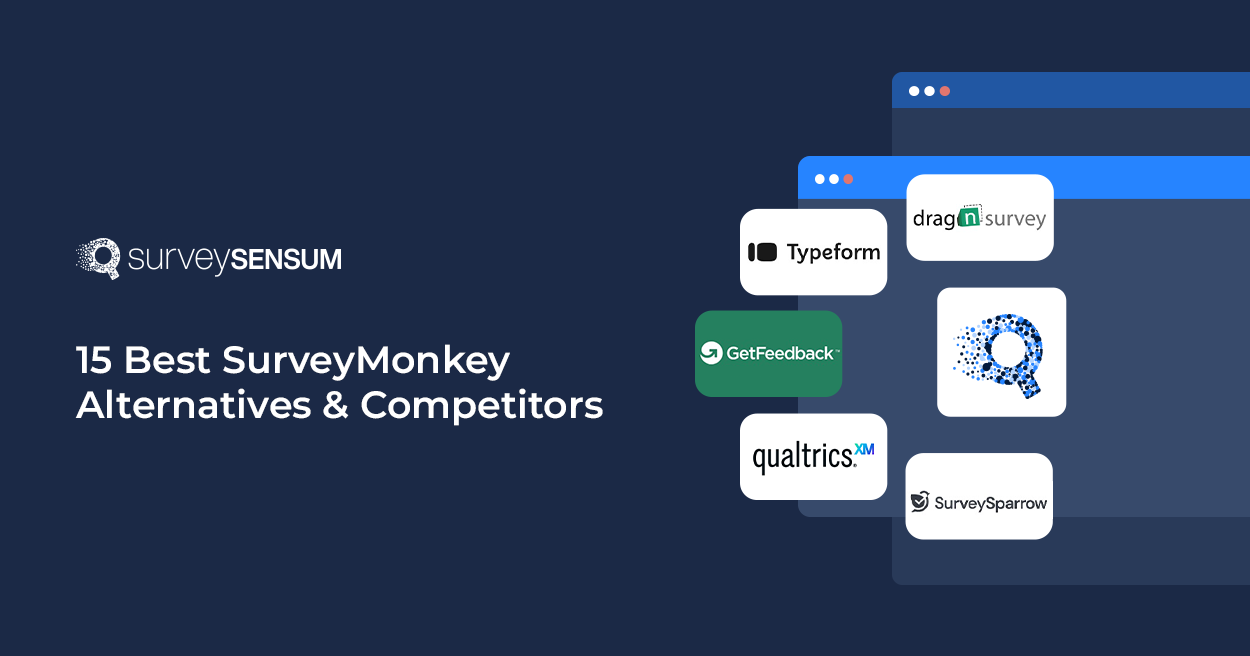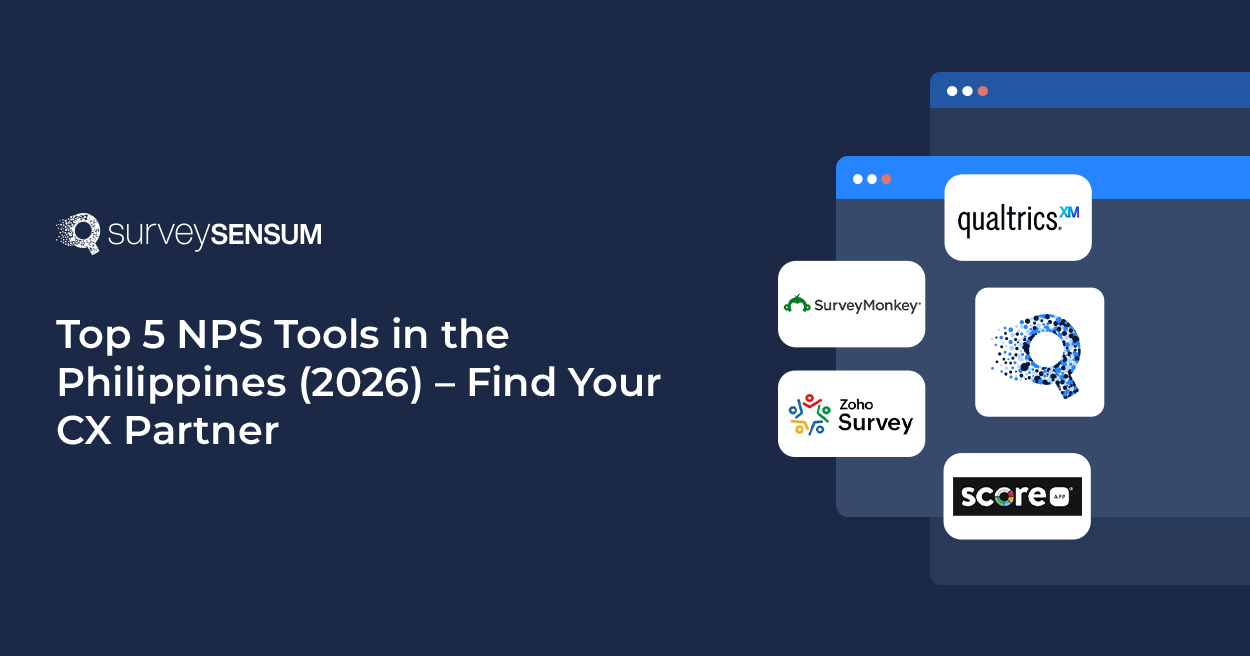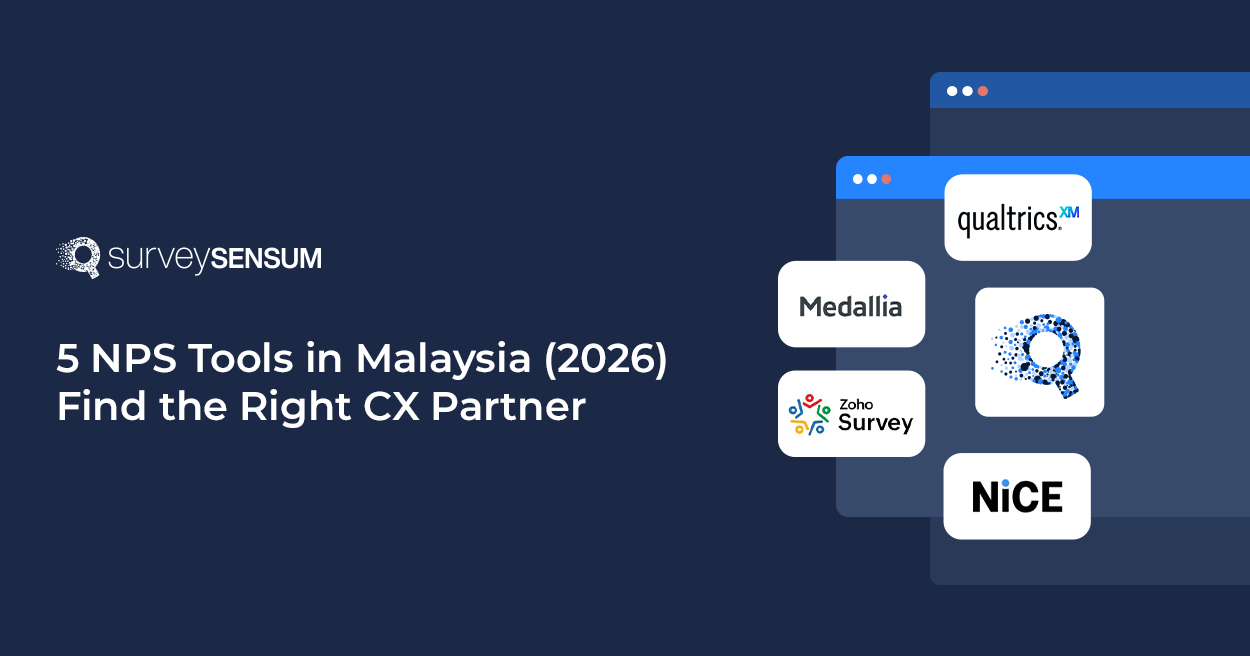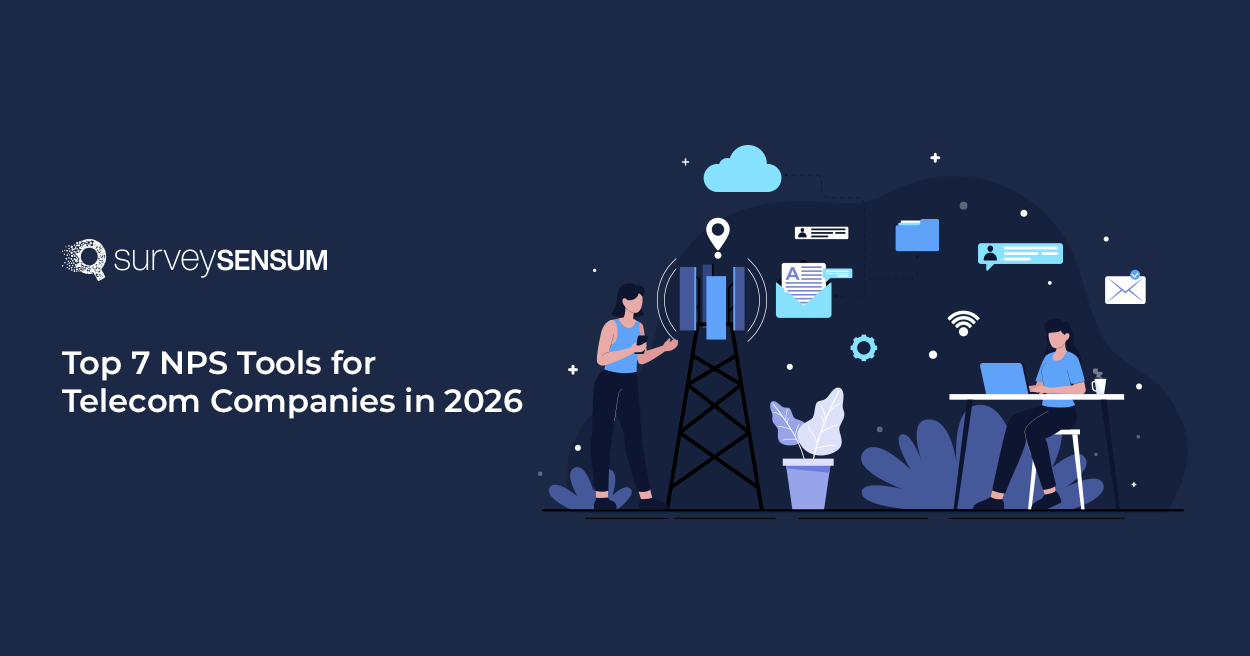

SurveyMonkey is a widely-used customer feedback tool that offers drag-and-drop functionality to design surveys and analyze data for actionable insights. However, it falls short in key areas like advanced capabilities and customization, which might limit your CX operations.
So, what exactly are these limitations? And what are the best alternatives to help you achieve your goals more effectively? Let’s dive in and find out!
Why Look for SurveyMonkey Alternatives?
SurveyMonkey has some significant shortcomings that may cause businesses to look for better options, so here are some key limitations of the tool as pointed out by users on G2.
1. Complex UI
Many users have complained that the user interface is sometimes difficult to navigate especially while looking at the survey data through a filter.

* Source: G2 review, Oct 08, 2024
2. Limited Reporting Capabilities
The reporting capabilities of SurveyMonkey are not very intuitive as pointed out by many users. The summary of the responses is not easy to understand.

* Source: G2 review, Oct 08, 2024
3. Expensive
The advanced features and detailed analytics are only available in the higher-tier plans, which can be expensive. Also, the extensive range of features and settings has a learning curve for new users.

* Source: G2 review, Sep 01, 2024
4. Limited Features in Free Plan
Users have experienced some limitations in the free plan like advanced features which are included in some survey tools like SurveySensum. These advanced features include question logic, exporting data in certain formats, etc, and accessing these features requires a paid subscription.

* Source: G2 review, Oct 02, 2024
5. Limited Customization Capabilities
Users have reported that the customization options are limited when it comes to designing branded surveys to include logos, brand design elements, etc.

* Source: G2 review, Oct 08, 2024
Considering these drawbacks, let’s talk about the best alternatives to SurveyMonkey in the market that will meet your business needs and goals more accurately.
Comparison Table of the Top 15 SurveyMonkey Alternatives & Competitors in 2026
| SurveyMonkey Alternatives | Features | Free Trial | Free Version | Pricing | G2 Rating |
| SurveySensum |
|
✅ | ✅ | Starts at $299/month | 4.7 |
| Qualtrics |
|
✅ | ✅ | Contact to know the pricing details | 4.4 |
| SurveySparrow |
|
✅ | ✅ | Business – $99/month
Enterprise – $499/month Elite – Contact for more information |
4.4 |
| Typeform |
|
✅ | ✅ | Basic – $29 per month
Plus – $59 per month Business – $99 per month |
4.5 |
| GetFeedback |
|
✅ | ❌ | Contact to know the pricing details | 4.5 |
| Qualaroo |
|
✅ | ❌ | Essential – $69 per month
Premium – $149 per month Business – $299 per month |
4.4 |
| UserReport |
|
✅ | ❌ | Contact to know the pricing details | Not available |
| QuestionPro |
|
✅ | ✅ | Advanced – $1188 per year | 4.5 |
| Alchemer |
|
✅ | ❌ | Collaborator – $55 per month
Professional – $165 per month Full access – $275 per month |
4.4 |
| Sogolytics |
|
✅ | ✅ | Plus – $25 per month
Pro – $66 per month Premium – $99 per month |
4.5 |
| Google Form |
|
✅ | ✅ | $12 per month | Not available |
| ProPorfs |
|
✅ | ✅ | Essential – $79 per month
Premium – $169 per month |
4.3 |
| Formstack |
|
✅ | ❌ | $50 per month | 4.4/5 |
| Jotform |
|
✅ | ✅ | $34 per month | 4.7/5 |
15 Best SurveyMonkey Alternatives & Competitors
We have compiled a list of the 15 best alternatives to SurveyMonkey. Let us explore their best features, pros, cons, and pricing factors in detail.
1. SurveySensum
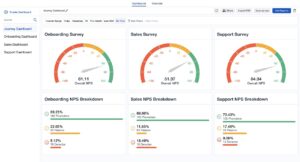
SurveySensum is an AI-enabled customer experience management platform that enables businesses of all sizes and industries to gather customer feedback, analyze it, and take prioritized action to improve customer satisfaction and loyalty.
And not just that. It offers a wide range of advanced capabilities like AI-enabled text and sentiment analysis tools to identify top customer sentiments and complaints, advanced reporting to better understand your data, and analytical dashboards for better visualization.
The tool also comes with CX consultations (at no extra charge). These CX consultants help you with everything – from designing surveys to figuring out what the results mean and how to use them to improve your business. They even connect your actions to specific goals, so you know you’re on the right track.
SurveySensum is the best SurveyMonkey alternative as it offers prompt support, unlimited training, customizable surveys, etc., along with high-end data security measures.
Best Features
-
NPS, CES & CSAT surveys
SurveySensum offers you in-built templates of multiple surveys such as NPS, CES, SSI, product, onboarding, pulse, and more; helping you launch a survey in just 2 minutes. All you need to do is select the template, add your branding and you are good to go!
-
Text and Sentiment Analytics
Eliminate the need for tagging conversations manually. Analyze and identify top customer complaints and sentiments and recurring patterns, automatically using machine learning and AI-enabled text and sentiment analytics.
-
Powerful Dashboards and Quick Reporting
Analyze key CX metrics and KPIs across any timeframe to pinpoint areas for improvement and visualize trends effortlessly through intuitive graphs. Also, empower every team member with the insights they need through the customizable, role-based dashboards.
-
Integrations
Going back and forth from multiple platforms can be a real hassle. That’s why you can seamlessly integrate any kind of platform that you use every day such as Outlook, Salesforce, Hubspot, Zendesk, Zapier, etc with SurveySensum.
Pros:
- 2-hour SLA support guaranteed
- Text analytics software
- Advanced Reporting
- Integrations (along with data import)
- Real-time ticketing management
- On-site support
- CX Consultation
- Closed-loop capabilities
- Transparent and affordable pricing
- Real-time customizable dashboards
- Cross-tab analysis
Cons:
- APIs or technical support needed to integrate with third-party apps
Pricing:
- Offers a free version and a free trial
- The basic plan starts at $299/month for 250 responses. Check their flexible pricing here.
SurveySensum’s advanced analytics lets you identify customer pain points and opportunities for growth – all with cost-effective pricing tailored to businesses of every size.
2. Qualtrics
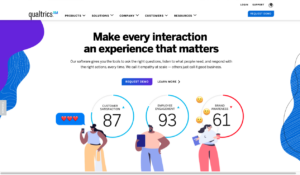
Remember SAP? Yeah, SAP owns Qualtrics, and it works best in multiple industries like healthcare, finance, tourism, retail, automobiles, etc. Yahoo, Microsoft, Yamaha, and many other prominent brands use Qualtrics.
Qualtrics offers you functional features like predictive AI, automated actions, customer experience management, business value realization, etc.
Best Features
-
Customer Feedback
Qualtrics offers a great customer feedback tool that generates real-time insights into the customers’ experience. It prevents any kind of negative feedback from impacting the brand as they are taken care of in time. Also, improving customer loyalty, optimizing customer onboarding, increasing brand awareness, and more.
-
Closed Loop Follow-Up
Use detailed feedback and insights to resolve bad customer experiences immediately and convert your detractors and passives to promoters. This tool lets you tag negative and positive messages, automate support, and close the loop quickly.
Listen to your customers during their journey with your products and services and understand what matters to them most. Personalize products and services, generate powerful insights, and prioritize actions and decisions.
Pros:
- Flexible, easy to learn, and easy to use
- Excellent customer support
- Customizable survey questions
Cons:
- Expensive
- Weak data analysis options
- Not the best option for SMEs or growth-stage companies
- Complex customization process
Pricing:
- Offers free trial
- Pricing details are not available. You need to contact the support team to get the exact pricing information.
3. SurveySparrow
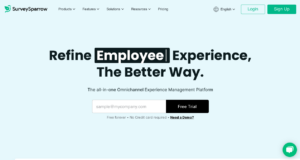
SurveySparrow is an all-in-one platform that optimizes all the touchpoints in a customer’s journey with intelligent features and an omnichannel experience.
It uses multi-level feedback systems to survey customers about their experiences. And you can easily integrate it into multiple ecosystems like Google, Salesforce, Zendesk, Freshdesk, Slack, etc.
Best Features
-
Offline & Online Data Collection
It removes internet dependency and allows you to collect data online and offline by entering a kiosk mode. It helps you collect data offline and synchronize it to the database whenever the internet resumes.
-
No-code Chatbots
Use a fully automated chatbot system to engage your customers and capture their feedback. It is easy to configure as pop-up cards, conversational bots, or embedded codes and offers real-life-like conversations.
Pros:
- Flexible and easy-to-capture feedback & data
- Built-in survey templates and simplified processes
- Survey distribution on multiple channels
Cons:
- Renaming is only possible with the Enterprise license
- Drag-and-drop customization is confusing for a user
- Inadequate customer support
Pricing:
Surveysparrow pricing starts at $19/month
4. Typeform
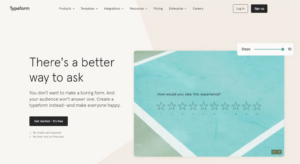
Typeform is a great SurveyMonkey alternative that offers several options to drive growth. It provides intuitive UI/UX and many interactive mediums to engage the audience.
The tool is highly responsive and offers brand customization options. The data collection part is fun. It integrates with several apps and software like MailChimp, Salesforce, etc. Some of its features are question branching, anywhere embedding, easy-to-share reports, etc.
Best Features
-
Easy to Integrate APIs
Connect easily with the most common integrations like Google Forms, Slack, Canva, Google Analytics, Microsoft Teams, etc., or get a custom workflow for your requirements to save time and energy.
-
Customer Feedback
It is easier for users to get more feedback and measure customer loyalty with conversational forms, video feedback, and interactive chatbots. The interactive sessions using photos and videos give a personalized user experience.
-
Question branching logic for deeper insights
Make personalized follow-up questions using conditional logic to get more qualitative insights into their feedback. Branching questions from follow-ups helps you make realistic and conversational surveys.
Pros:
- Offers several customizations, survey question types, and design options
- Lets you embed TypeForm into your website or apps
- Integrates with several third-party apps or APIs easily.
Cons:
- Response limitations and feature restrictions in the free version
- Each time the tool is updated, it gets expensive
- Expensive for small businesses and startups
Pricing:
- Offers a free plan
- Their pricing plan is as follows –
- Basic – $29 per month
- Plus – $59 per month
- Business – $99 per month
5. GetFeedback
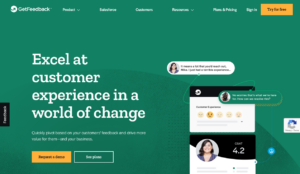
GetFeedback is an agile and quick customer feedback tool that helps you enhance the customer experience quickly using creative interactions and digital experiences. Make the right decisions on time and improve customer retention by identifying and eliminating friction points. It allows you to listen to the customers and deliver personalized solutions to improve loyalty, engagement, and customer satisfaction.
Best Features
-
All-in-one customer feedback management
GetFeedback offers an all-in-one tool to analyze and manage customer feedback in real-time. It enables you to send surveys to the right person at the right time and compile all the surveys together to identify the NPS score, CSAT score, CES score, and more.
-
Seamless integrations with apps
Connect your customer feedback data to hundreds of third-party software and APIs like Salesforce, Slack, Google Analytics, Zendesk, Jira, etc., and create purposeful insights in real-time.
-
Automate tasks on critical feedback
Drive actions from customer feedback and create customized notifications for the team. It lets you create workflows and alerts so that the team can immediately act upon critical feedback and maintain customer experience.
Pros:
- Easy to use and flexible interface
- Intuitive UI
- Easy to set up and integrate with apps
Cons:
- Already a costly platform but gets more expensive every year
- Misses critical features like user permission setting and sharing control
- Unable to edit CSS or HTML files and has limited survey customization features
Pricing:
- Does not offer a free trial
- Contact the sales team for personalized quotes
6. Drag’n Survey
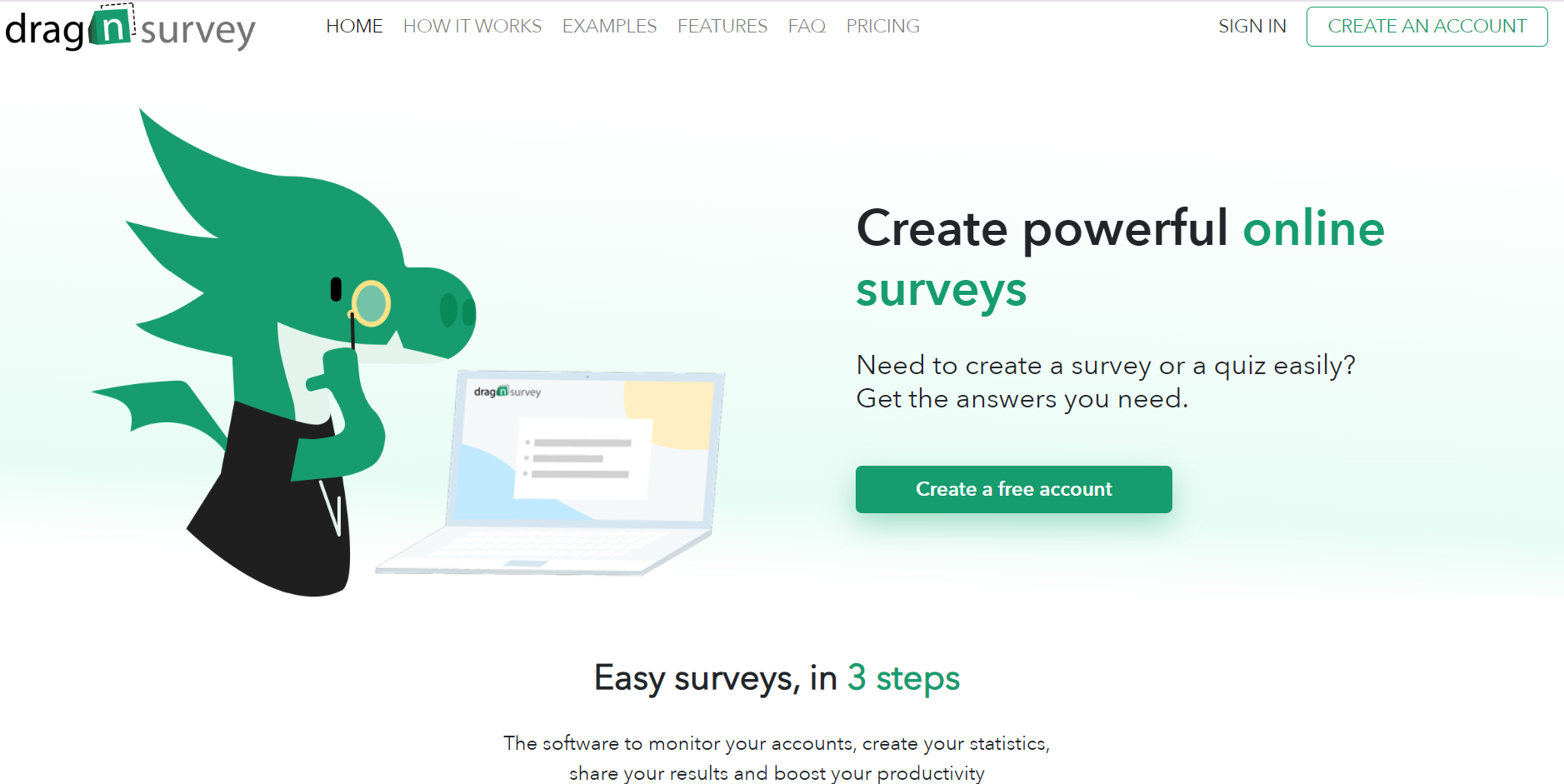
Drag’n Survey is an online survey software that stands out for its ease of use, powerful features, and highly designed surveys. Using the software requires no training. Users navigate fluidly through the software.
The tool emphasizes flexibility, allowing users to create interactive and visually appealing surveys. The software offers more than 20 different question types. Users can thus create all types of surveys and collect the data they need. Drag’n Survey provides an advanced results analysis interface. Users can create 100% customized reports.
Best Features
-
Survey creation via Artificial Intelligence.
No more starting from a blank page to create a survey. Simply enter a prompt and Drag’n Survey’s AI creates the survey for you. You can also upload an existing survey in Word, PDF, or JPEG format, and the AI will recreate your survey in Drag’n Survey.
-
Advanced customization
Create well-designed surveys that showcase your brand image. Adapt the appearance of your surveys by incorporating your logo and brand colors. Integrate background images and videos. Add a banner or partition your survey page in two. All designs are possible.
-
Real-time data analysis
Collect data in real-time. Customize your reports with text areas, data cross-tabulations, and pivot tables. Analyze your customers’ insights on text fields and measure their satisfaction level.
Pros:
- Great flexibility in the survey builder
- Numerous options for sharing and distributing surveys
- Advanced features in results analysis
Cons:
- Some advanced features are only available in higher-tier plans
- The learning curve may be slightly longer for advanced results analysis
- Support is very responsive but only available via email
Pricing:
- Offers a free plan with basic features
- Paid plans are structured as follows:
- Plus – 28 USD per month or 240 USD when paid annually
- Premium – 47 USD per month or 456 USD when paid annually
7. Qualaroo
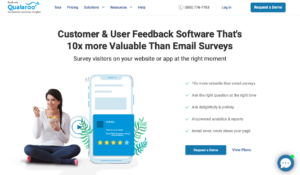
Qualaroo uses powerful AI analysis and research tools to collect feedback and generate insights from it. It offers you in-depth details of your customers, their locations, duration history, and more.
Moreover, Qualaroo gives you customizable questions and templates to create efficient surveys. It is multi-device compatible and provides features and functionalities like question branching, libraries, online and offline feedback collection, and integration with several APIs and tools.
Best Features
-
AI Sentiment Analysis
It uses IBM Watson-powered AI tools to generate accurate insights on customer sentiments in real-time. Identify keywords and tag emotions like happiness, sadness, fear, frustration, and more to offer personalized solutions to customers.
-
Question Branching
Question branching logic allows you to branch out questions to visitors based on the information provided. You can set multiple message screens with premium licenses to customize messages.
-
Nudge for Prototypes
Customize your prototype designs to generate insights quickly. Just use a URL to start collecting insights and get summaries and analytics in the dashboard.
Pros:
- Advanced targeting and white labeling options
- Highly effective A/B testing with Nudge Prototypes
- Automatic translation allows users to send surveys in any language
Cons:
- Limited options to export data in multiple formats
- Offers limited features in the trial version
- Unable to embed surveys in mail body or create custom charts
Pricing:
- Offers a free trial for 15 days
- Their paid plan is as follows
- Essential – $69 per month
- Premium – $149 per month
- Business – $299 per month
Analyze customer sentiments and extract actionable insights from unstructured data with SurveySensum’s AI-enabled text and sentiment analysis!
8. UserReport
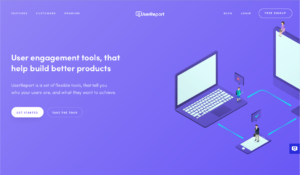
UserReport is another great choice for a SurveyMonkey alternative. It runs as part of your website, allowing you to interact directly with your customers. It has two widgets that make the entire process easier – a survey tool and a feedback tool. UserReport provides an easy-to-set-up kit to identify your customers and increase your sales pitch. Create quick surveys, collect feedback, and integrate with Google Analytics to view segmentized insights. It helps you monitor the customer satisfaction level to offer an enhanced experience.
Best Features
-
Google Analytics Integration
Integrate Google Analytics to UserReport and generate various insights based on demographics and user preferences to offer a personalized customer experience with heatmaps to track user activities.
-
Survey Widget
Survey creation is easier in UserReport. Use free code snippets and paste them on your website to generate feedback. Identify user feedback, NPS score, demographics, and much more.
-
Feedback Widget
Use the Feedback widget to compile user ideas and create products and brands that people love. Prioritize features by upvoting and creating localized and customizable graphics.
Pros:
- Easy to integrate with websites
- Easy to use and set up
Cons:
- Not suitable for low-traffic websites
Pricing:
- Offers free version
- Contact the sales team to get customized quotes.
9. QuestionPro
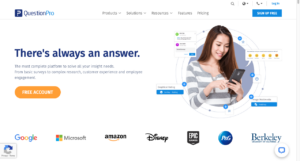
Question Pro allows you to customize surveys and themes to suit your branding when interacting with your customers. It also helps you create your surveys with logos, desired fonts, and graphics.
QuestionPro is a great alternative to SurveyMonkey as it allows you to integrate with hundreds of applications and collaborate with people easily. You can create multilingual surveys and have 30-plus different surveys to choose from.
Best Features
-
NPS+
Identify what is best for your promoters and how to win your detractors using NPS surveys. NPS+ gives you the advantage of accuracy, improved customer experience, and a voting system to identify critical issues.
-
Voice of the Customer Tools
Use multilingual and multi-device-compatible surveys to understand the voice of the customers at their convenience.
Pros:
- Easy to set up and survey
- easy to edit, add, or restructure surveys
- Can create surveys in multiple languages
Cons:
- Data importing is a bit complicated process
- Provides must-have features only in paid versions
- The user interface is not as modern or intuitive as other survey tools.
Pricing:
- Offers a free plan
- Pricing starts from $129/month for 35+ question types and branding options
→ Read more on the top 9 QuestionPro alternatives and competitors in 2026!
10. Alchemer

Alchemer (earlier known as SurveyGizmo) is a rich platform that offers several features and an intuitive user interface. The one thing that forces users to try Alchemer is its pricing and reporting section.
The tool offers unique question types and complex filters in reports. It allows companies to create surveys and collect feedback the way they want.
Best Features
-
Customer Feedback
It allows you to deliver a holistic customer experience by responding to feedback at the right time using data visualization, custom workflows, integrations, and more.
-
Feedback Collection
Run sophisticated surveys to collect feedback and generate deeper analytics about customer experience. Use segmentation features to identify relevant information and integrate the CRM or ERP with the software.
Pros:
- Survey software is flexible and easy to set up & use
- Excellent customer support and assistance
- Can import raw data and share it in multiple formats
Cons:
- New features rolled out are pricey
- Limited customization options
- Cannot track previous survey responses when you make a follow-up survey
Pricing:
- Offers a free trial
- Their paid plan includes:
- Collaborator license starts from $55/user/month
- Professional license starts from $165/user/month
- Full access license starts from $275/user/month
11. Sogolytics
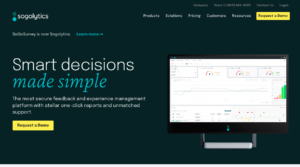
Sogolytics, previously known as SoGoSurveys is an experience management platform that helps you get feedback and insights into customer and employee experience using surveys and questionnaires.
Sogolytics’s survey platform comes with built-in templates and features like question branching, skip logic, survey customization, etc. It lets you create personalized surveys without hassles and incorporates the best UI and UX features to make them appealing.
Best Features
-
Feedback Channels
Capture feedback using multiple channels like online surveys, social media, emails, text messaging, etc., and identify the sentiments to make intelligent decisions on time.
Listen to your customers from various touchpoints, analyze feedback, and decide quickly on the options for improvement to drive business growth.
Pros:
- Allows you to create and distribute surveys and questionnaires in multiple formats
- User-friendly platform that supports multiple languages
- Enables you to create and save custom questions and surveys and use them in the future
Cons:
- The free version has been removed after the company rebranded.
- Limited integration with third-party apps.
Pricing:
- It has a free version available and its paid plans are as follows
- Plus – $25 per month
- Pro – $66 per month
- Premium – $99 per month
12. Google Forms
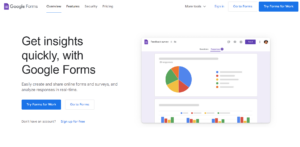
Google Forms is another alternative to SurveyMonkey. It is a simple and powerful tool allowing users to create online surveys quickly and with ease. The tool is seamlessly integrated with all Google apps like Google Docs, sheets, slides, etc.
Best Features
-
Analyze Responses With Automated Summaries
Google Forms provides built-in analytics to help you review survey results instantly. Automated charts, graphs, and summaries break down responses visually, making it easy to identify trends and insights without the need for additional tools or expertise.
-
Seamless Integration with Google Workspace
Google Forms seamlessly integrates with Google Workspace, including tools like Google Docs, Sheets, Slides, and Gmail. This integration allows you to leverage the power of collaboration, share forms effortlessly, and manage data more effectively across your team or organization.
Pros:
- Unlimited number of questions
- Real-time responses
- Enhanced security
- Easy-to-use interface
- Free tool
Cons:
- Limited design customization for surveys
- Can’t integrate with any 3rd party tools
Pricing:
- Free for personal use
- $12 per user/month for business uses
→ 10 Google Form Alternatives to Try in 2026 – Free & Paid
13. ProProfs

This tool helps you create versatile online surveys including but not limited to NPS surveys, quizzes, polls & pop-up surveys. In addition to this, the tool is rich in templates and has a collection of a wide variety of survey questions. The tool allows you to integrate third-party tools like MailChimp, FreshDesk, Zendeak, Constant Contact & Salesforce.
Best Features:
-
Import and Export of Survey Data
The platform allows you to easily import existing survey data from various formats and export your survey results to spreadsheets, CSV files, or other tools.
-
Develop Custom URLs for Surveys
Create personalized and branded URLs for your surveys to ensure they resonate with your audience.
Pros:
- Provide detailed survey results
- Easy segregation of survey response statistics
- Support multi-lingual surveys
- Allows multiple 3rd party integrations
Cons:
- Doesn’t include a data analysis tool
- Doesn’t allow integration with any Google apps
Pricing:
They do allow free trials, but the features available are limited. The pricing is based on the type of survey you do, the pricing for Contextual and Email Surveys are
- Essentials – $79/month
- Premium – $169/month
- Business – Get in touch with sales to get a pricing quote
Leverage SurveySensum’s cutting-edge data analysis capabilities to transform unstructured data into actionable insights and take your CX strategy to the next level!
14. Formstack

Formstack is a cloud-based AI survey tool that enables businesses to streamline their survey process – from gathering survey data to managing data, and survey workflow. It offers an intuitive and no-code solution for creating online forms, surveys, and documents while integrating with other tools to automate workflows and enhance productivity.
Best Features:
-
Workflow Automation:
You can set up workflows to route submissions, trigger email notifications, or update records in integrated tools.
-
Integration Capabilities:
The tool integrates with popular applications that include CRM platforms like Salesforce, and HubSpot, payment gateways like Stripe, and PayPal, and marketing tools, making it easy to connect your data across systems.
Pros:
- Conditional logic
- In-built survey templates
Cons:
- Lacks the ability to duplicate forms
- No integration with Active Directory to manage users
Pricing:
The pricing plan starts at $50/month.
15. Jotform

Jotform is an easy-to-use survey tool that empowers users to create customer surveys and reports. The tool is known for its versatility, offering robust features to gather, manage, and analyze data efficiently.
Best Features:
-
Mobile Survey Responsiveness
Ensure your forms work seamlessly on any device, including smartphones and tablets.
-
Notifications and Autoresponders
Receive instant alerts for new submissions and automate personalized follow-up messages.
Pros:
- Easy to set up and use
- Instant alerts for new submissions
Cons:
- HIPPA-compliance is a paid feature
- Poor customer support
Pricing:
The pricing plan starts at $39/month.
Let’s now understand the process of choosing the best SurveyMonkey alternative that suits your business needs.
How to Choose the Best SurveyMonkey Alternative?
With so many options available in the market, choosing the right SurveyMonkey alternative can be tricky so here are key features to consider while choosing the right alternative for your business needs.
1. Price
Budget is a key factor when choosing the right survey tool, so compare pricing plans across different tools and evaluate what features are included at each price point. Look for a tool with transparent pricing plans with no hidden fees. For example, some tools provide advanced features such as AI-driven analytics in their premium plans, so ensure that the features you need are available within your budget.
2. Advanced Capabilities
The right survey tool should align with your unique requirements and offer the functionalities that matter most to your business. Look for:
- Customizable Surveys: Ability to create branded surveys tailored to your goals.
- Advanced Reporting and Analytics: Real-time data analysis to uncover actionable insights.
- Integrations: Seamless integration with existing tools like CRM, marketing platforms, or project management software.
- AI-Powered Insights: Some platforms offer sentiment analysis and other AI-driven insights to help you understand feedback at scale.
- Multilingual Support: Essential for businesses operating in diverse regions.
- Closed-Loop Feedback Systems: Tools that help you act on feedback by creating follow-up tasks for your teams.
3. User experience
The ease of use of a survey platform can significantly impact your team’s productivity. Choose a tool that is user-friendly, even for those without technical expertise. Key considerations include:
- Intuitive Interface: A simple and clean interface that makes survey creation, customization, and management hassle-free.
- Responsiveness: Tools that adapt well to various devices, ensuring a smooth experience for both survey creators and respondents.
- Customer Support: Access to reliable and prompt support, including tutorials, live chat, or a knowledge base.
- Learning Curve: Platforms that require minimal training or onboarding are ideal, especially for fast-paced organizations.
Choose the right SurveyMonkey Alternative
Choosing the right tool can be a challenging endeavor if you don’t have your ducks in a row. So, understand your needs and prioritize your features before you set out to compare tools. Review each of the survey tools and choose the one that offers you value for your money and offers maximum features in one go. Also, go for a tool that offers a free trial or version for you to explore all the important features.
Now, SurveySensum meets these requirements quite effectively. The tool offers advanced features as well as basic features in cost-effective pricing plans and also comes with a free version for your check out all features. The tool goes one step further with CX consultation and helps you take relevant action on the gathered insights to drive data-driven improvements that impact your bottom line.
Extract Actionable Insights with SurveySensum’s AI-driven Analytics Capabilities!
Frequently Asked Questions on SurveyMonkey Alternatives
It depends on your needs:
Qualtrics is better for large enterprises, academic research, and complex survey logic. It offers advanced analytics, customizable dashboards, and experience management solutions. However, the tool can be expensive for small-to-medium-sized businesses and comes with a steep learning curve. Whereas SurveyMonkey is ideal for all businesses, teams, and individuals looking for a user-friendly, quick survey creation tool.
Google Forms is free, intuitive, and great for basic surveys, quizzes, and internal use, especially for Google Workspace users. SurveyMonkey provides more professional templates, logic features, and analytics than Google Forms, but most advanced features are behind a paywall.
Yes, SurveyMonkey still has a free plan.
Microsoft Forms is better for internal surveys, quick polls, and quizzes, especially for Microsoft 365 users. It integrates well with Teams, Excel, and Outlook. SurveyMonkey excels in external surveys, offering more customization, logic tools, and analytics features for deeper feedback collection.






